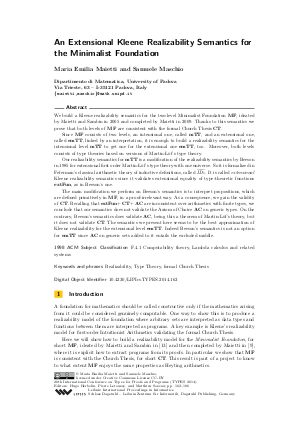An Extensional Kleene Realizability Semantics for the Minimalist Foundation
Authors Maria Emilia Maietti, Samuele Maschio
-
Part of:
Volume:
20th International Conference on Types for Proofs and Programs (TYPES 2014)
Part of: Series: Leibniz International Proceedings in Informatics (LIPIcs)
Part of: Conference: International Conference on Types for Proofs and Programs (TYPES) - License:
 Creative Commons Attribution 3.0 Unported license
Creative Commons Attribution 3.0 Unported license
- Publication Date: 2015-10-12
File

PDF
LIPIcs.TYPES.2014.162.pdf
- Filesize: 0.63 MB
- 25 pages
Document Identifiers
Subject Classification
Keywords
- Realizability
- Type Theory
- formal Church Thesis
Metrics
- Access Statistics
-
Total Accesses (updated on a weekly basis)
0PDF Downloads0Metadata Views
Abstract
We build a Kleene realizability semantics for the two-level Minimalist Foundation MF, ideated by Maietti and Sambin in 2005 and completed by Maietti in 2009. Thanks to this semantics we prove that both levels of MF are consistent with the formal Church Thesis CT. Since MF consists of two levels, an intensional one, called mtt, and an extensional one, called emtt, linked by an interpretation, it is enough to build a realizability semantics for the intensional level mtt to get one for the extensional one emtt, too. Moreover, both levels consists of type theories based on versions of Martin-Löf's type theory. Our realizability semantics for mtt is a modification of the realizability semantics by Beeson in 1985 for extensional first order Martin-Löf's type theory with one universe. So it is formalized in Feferman's classical arithmetic theory of inductive definitions, called ID1^. It is called extensional Kleene realizability semantics since it validates extensional equality of type-theoretic functions extFun, as in Beeson's one. The main modification we perform on Beeson's semantics is to interpret propositions, which are defined primitively in MF, in a proof-irrelevant way. As a consequence, we gain the validity of CT. Recalling that extFun+CT+AC are inconsistent over arithmetics with finite types, we conclude that our semantics does not validate the Axiom of Choice AC on generic types. On the contrary, Beeson's semantics does validate AC, being this a theorem of Martin-Löf's theory, but it does not validate CT. The semantics we present here seems to be the best approximation of Kleene realizability for the extensional level emtt. Indeed Beeson's semantics is not an option for emtt since AC on generic sets added to it entails the excluded middle.
Cite As Get BibTex
Maria Emilia Maietti and Samuele Maschio. An Extensional Kleene Realizability Semantics for the Minimalist Foundation. In 20th International Conference on Types for Proofs and Programs (TYPES 2014). Leibniz International Proceedings in Informatics (LIPIcs), Volume 39, pp. 162-186, Schloss Dagstuhl – Leibniz-Zentrum für Informatik (2015)
https://doi.org/10.4230/LIPIcs.TYPES.2014.162
BibTex
@InProceedings{maietti_et_al:LIPIcs.TYPES.2014.162,
author = {Maietti, Maria Emilia and Maschio, Samuele},
title = {{An Extensional Kleene Realizability Semantics for the Minimalist Foundation}},
booktitle = {20th International Conference on Types for Proofs and Programs (TYPES 2014)},
pages = {162--186},
series = {Leibniz International Proceedings in Informatics (LIPIcs)},
ISBN = {978-3-939897-88-0},
ISSN = {1868-8969},
year = {2015},
volume = {39},
editor = {Herbelin, Hugo and Letouzey, Pierre and Sozeau, Matthieu},
publisher = {Schloss Dagstuhl -- Leibniz-Zentrum f{\"u}r Informatik},
address = {Dagstuhl, Germany},
URL = {https://drops.dagstuhl.de/entities/document/10.4230/LIPIcs.TYPES.2014.162},
URN = {urn:nbn:de:0030-drops-54966},
doi = {10.4230/LIPIcs.TYPES.2014.162},
annote = {Keywords: Realizability, Type Theory, formal Church Thesis}
}
Author Details
References
-
G. Barthes, V. Capretta, and O. Pons. Setoids in type theory. J. Funct. Programming, 13(2):261-293, 2003. Special issue on "Logical frameworks and metalanguages".

-
M. Beeson. Foundations of Constructive Mathematics. Springer-Verlag, Berlin, 1985.

-
E. Bishop. Foundations of Constructive Analysis. McGraw-Hill Book Co., 1967.

-
T. Coquand. Metamathematical investigation of a calculus of constructions. In P. Odifreddi, editor, Logic in Computer Science, pages 91-122. Academic Press, 1990.

-
S. Feferman. Iterated inductive fixed-point theories: application to Hancock’s conjecture. In Patras Logic Symposion, pages 171-196. North Holland, 1982.

-
M. Hofmann. Extensional Constructs in Intensional Type Theory. Distinguished Dissertations. Springer, 1997.

-
J. M. E. Hyland. The effective topos. In The L.E.J. Brouwer Centenary Symposium (Noordwijkerhout, 1981), volume 110 of Stud. Logic Foundations Math., pages 165-216. North-Holland, Amsterdam-New York, 1982.

-
J. M. E. Hyland, P. T. Johnstone, and A. M. Pitts. Tripos theory. Bull. Austral. Math. Soc., 88:205-232, 1980.

-
M. E. Maietti. A minimalist two-level foundation for constructive mathematics. Annals of Pure and Applied Logic, 160(3):319-354, 2009.

-
M. E. Maietti and G. Rosolini. Elementary quotient completion. Theory and Applications of Categories, 27(17):445-463, 2013.

-
M. E. Maietti and G. Rosolini. Quotient completion for the foundation of constructive mathematics. Logica Universalis, 7(3):371-402, 2013.

-
M. E. Maietti and G. Rosolini. Unifying exact completions. Applied Categorical Structures, DOI 10.1007/s10485-013-9360-5, 2013.

-
M. E. Maietti and G. Sambin. Toward a minimalist foundation for constructive mathematics. In L. Crosilla and P. Schuster, editor, From Sets and Types to Topology and Analysis: Practicable Foundations for Constructive Mathematics, number 48 in Oxford Logic Guides, pages 91-114. Oxford University Press, 2005.

-
M. E. Maietti and G. Sambin. Why topology in the Minimalist Foundation must be pointfree. Logic and Logical Philosophy, 22(2):167-199, 2013.

-
P. Martin-Löf. Notes on Constructive Mathematics. Almqvist & Wiksell, 1970.

-
P. Martin-Löf. Intuitionistic Type Theory. Notes by G. Sambin of a series of lectures given in Padua, June 1980. Bibliopolis, Naples, 1984.

-
B. Nordström, K. Petersson, and J. Smith. Programming in Martin Löf’s Type Theory. Clarendon Press, Oxford, 1990.

-
P. Odifreddi. Classical recursion theory, volume 125 of Studies in Logic and the Foundations of Mathematics. North-Holland Publishing Co., 1989.

-
E. Palmgren. Bishop’s set theory. Slides for lecture at the TYPES summer school, 2005.

-
A. S. Troelstra and D. van Dalen. Constructivism in mathematics, an introduction, vol. I. In Studies in logic and the foundations of mathematics. North-Holland, 1988.

